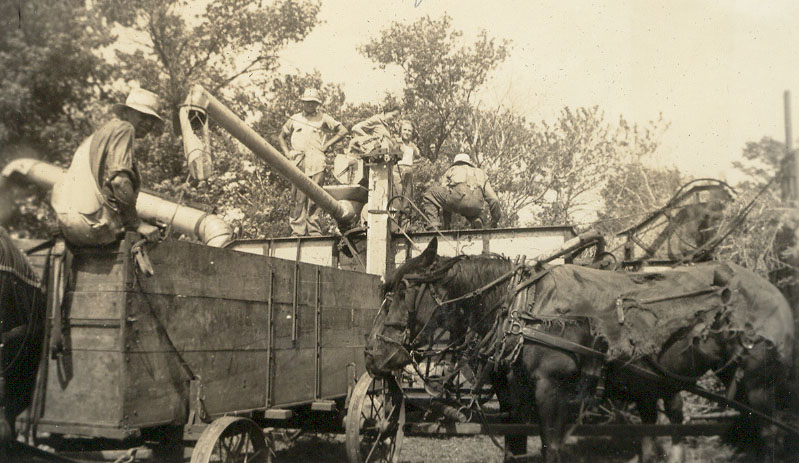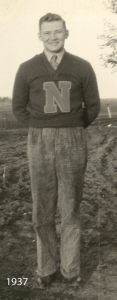 Fritz’s Youth
Fritz’s Youth
This story was written in 1995 by my father, Galen “Fritz” Stratton. It was typed on his typewriter. After high school, Dad worked as a typist for Donnally’s in Nevada, Iowa for a while before he started farming with his dad. Dad thought it was the end of the world when they quit making typewriter ribbons. My daughter Karmin had a high school assignment to have a grandparent tell them about their life growing up. Galen Fredrick Stratton was born May 11, 1920 on a farm in Richland Township, Story County, Iowa, northeast of Nevada. He lived on this farm until 1939 when the family (Glen and Rose, Garnett, Art, Galen, Jeanne) moved to Milford Township. In December of 1945, my dad and mom, and me, moved to Grant Township one mile west of Nevada on Highway 30. Dad lived there until he retired at age 62. This is his story.
I was born in Richland Township, Story County Iowa on a farm near Nevada, Iowa. One of my first memories was a Model T ford car about a 1919 model with side curtains to protect you from the elements. There were no heaters in these cars, so you used lap robes and winter clothing to be comfortable in winter travel.
We had chores to do at an early age like about 4 or 5 years and started out by doing things like gathering the eggs and feeding baby chickens and gradually worked up to milking cows, feeding horses, cattle, hogs, and sheep and learning about the care and management of draft horses used on farms at that time. We had room for 8 head of draft horses in the barn and through observation by the age of about 12 years, my brother and I could harness and hitch a two horse team, a 3 horse team, or a four horse team. We were able to work the gentle teams and left the high spirited horses for our Father and Grandfather to handle. We also kept a saddle horse which we depended on to round up cattle and horses and also for personal transportation which was usually limited to a 10 mile radius of our home. I rode this horse to school much of the time when the weather wasn’t too severe. We had no shelter for horses at the country school house location, so the horse had to be secured to a fence post by a halter rope for 7 hours before we could go home. My daily routine in the morning was to get up between 5 and 6 A.M. and head for the barn where we fed the horses, cattle, and hogs, milked the cows and separated the milk from the cream and then take the cream to the house and eat breakfast and then back to the barn to saddle my horse and stop by the house to pick up my lunch and off 2 miles to school. We did chores again at night and there was no way we could get out of helping milk the cows even in the slack winter season because it was all done by hand and time consuming.
During my 8 years in a one room county school five cents would buy a candy bar and10 cents would take you to a movie (silent movie, that is). Our usual allowance per week ranged from 15 cents to 25 cents and if we had special requirements we might get 50 cents, but that was tops. A new pair of bib overalls was about $1.00 and a pair of work shoes were about $2.00. When I graduated high school and got a job my first dress suit cost $20.00 and it was of real good quality.
We got our first battery radio in 1932 and this was a sensational experience as far as news and entertainment was concerned. We listened to Lum and Abner, Amos and Andy, One Man’s Family, Fibber McGee and Molly, Jack Benny, and many others. We had bob sled parties, ice skating parties, card parties, and sometimes snow skied behind our saddle horse. We had neighborhood oyster stews, ice cream socials, square dances, and card parties on a regular basis and exchanged labor on jobs like making hay, threshing, shelling corn, and many other jobs. Wild game was plentiful during my youth and we spent many days in the winter hunting cottontails, jack rabbits, prairie chickens, ducks, and geese. There were very few deer and I never saw a pheasant until about 1933. We did some fishing in small streams in the area and always had a swimming hole located along those streams. In order to haul our fishing gear, we usually would drive a one horse buggy to the site and take a picnic dinner and believe me that was a big deal.
I remember the depression of the ‘30s and the stock market crash along with the closing of the banks. My Father had very little money in the bank so we didn’t lose as much as some folks did. Times were tough as far as money was concerned but we didn’t suffer much because we didn’t have much money to start with and we had big gardens along with milk, meat, eggs, and poultry. About all the groceries my Mother bought were staples and she baked our own bread, churned our own butter, and canned numerous amounts of fruit and vegetables. We also had an underground cave to store food in and it was usually pretty full by fall of each year. The economy perked up in the mid-‘30s and my father bought his first new car in 1937. What a thrill!
I remember the Lindburg landing and figured the guy was wacky. I didn’t think he’d make it and everybody was overjoyed when he did.
In looking back, I feel very fortunate to have lived in my time. I think the values of most of the people of my generation were solid and as far as farm life goes, the advancements have been almost unbelievable. It has been a wonderful life for me.



